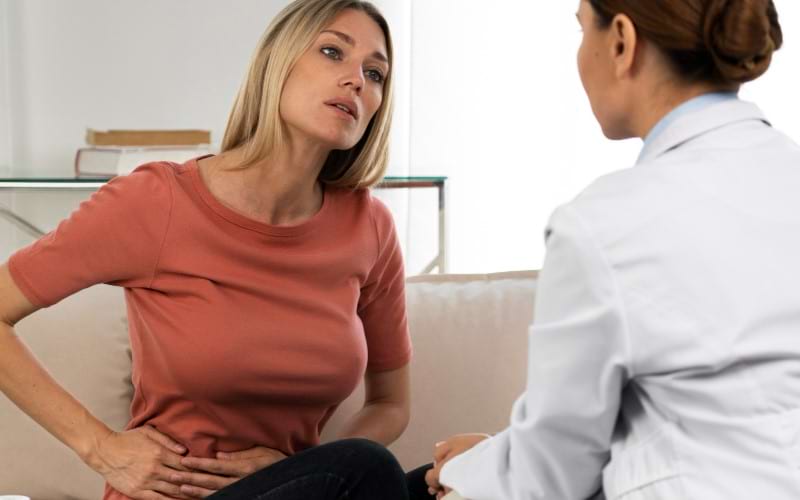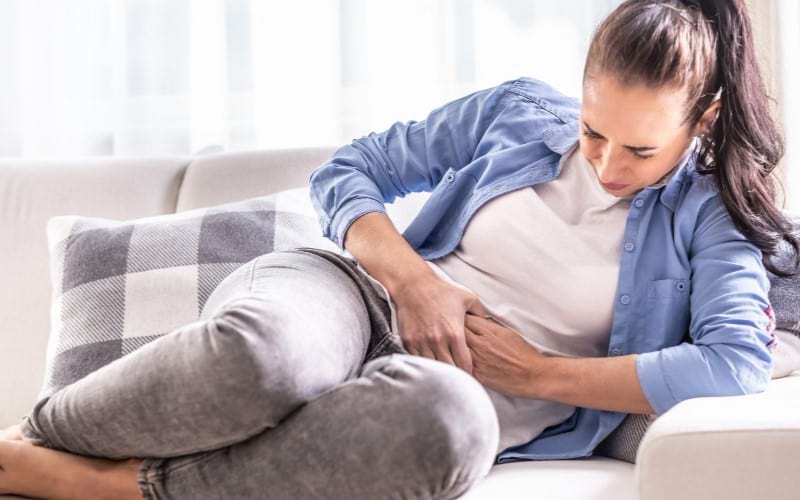Stabbing pain after gallbladder removal is a common issue caused by various factors such as post-operative inflammation, post-cholecystectomy syndrome, sphincter of Oddi dysfunction, adhesions, nerve damage, or a hernia. It is essential to speak with your doctor to determine the specific cause of your pain and discuss the appropriate treatment options, including medications, physical therapy, or surgery. Additionally, preventative measures such as maintaining a healthy diet, avoiding high-fat foods, and managing stress can help alleviate and prevent pain. Managing stabbing pain after gallbladder removal does not have a one-size-fits-all solution, so determining your best course of action may take trial and error.
Patients face many problems after gallbladder removal. It is typical for patients to have some degree of pain or discomfort following gallbladder removal surgery.
A stabbing pain that might develop in the region where the gallbladder was removed is one of the most upsetting symptoms some patients might encounter.
Patients may find it challenging to carry out their everyday activities since this sort of pain can be abrupt, strong, and sharp.
There are many reasons for stabbing pain after gallbladder removal, and numerous treatments can be used to address this symptom. With proper care and information, you can deal with the pain.
Causes of stabbing pain after gallbladder removal
After having your gallbladder removed, you might encounter a few side effects, including searing pain. Numerous factors may contribute to this sort of pain:
Post-operative inflammation
If the incision was big, inflammation in the area where the gallbladder was removed might be painful.
Post-cholecystectomy syndrome
As a result of damage to the common bile duct or the cystic duct during surgery, this condition can develop symptoms like abdominal pain, nausea, and diarrhea.
Sphincter of Oddi dysfunction
The sphincter of Oddi is a muscle located at the intersection of the pancreatic duct and the common bile duct. Pain and other side effects could result from this muscle being damaged during surgery.
Adhesions
Scar tissue that develops in the region where the gallbladder was removed can cause pain and discomfort.
Nerve damage
Surgery can harm the nerves that go through the region where the gallbladder was removed, causing pain.
Hernia
An incision made during surgery may result in a hernia, which can be painful and uncomfortable.
You must consult your surgeon or primary care physician if you feel stabbing pain following gallbladder removal.
They can assist in identifying the problem’s root cause and provide the proper care.
Treatment options for stabbing pain
Many treatment options are available depending on the underlying cause of the stabbing pain following gallbladder removal.
Medications are frequently used as the first line of treatment and can aid in symptom management and inflammation reduction.
We will also discuss the role of physical therapy and surgery in treating pain following gallbladder removal and when each of these approaches may be necessary.

Medications
Antibiotics
One of the most frequent reasons for discomfort following surgery is infection. Complications can be avoided by using antibiotics to treat and prevent infections.
Painkillers
Ibuprofen and Acetaminophen, two over-the-counter painkillers, can help to minimize discomfort and inflammation, whereas prescription pain relievers, such as opioids, may be used for more severe pain.
Muscle relaxants
After gallbladder removal, some people may experience muscle cramps or spasms, increasing pain. Drugs that relax the muscles can assist with these sensations.
Anti-spasmodic
Anti-spasmodic medications can help relax the smooth muscle in the biliary tract, reducing pain caused by spasms.
Anti-anxiety medication
Since stress and anxiety can worsen the pain, anti-anxiety medication may be administered to help with pain management.
Physical therapy
Physical therapy might be a successful therapeutic choice for people suffering from stabbing pain after gallbladder removal.
Physical therapy can assist in building up the muscles in the back and abdomen, reducing discomfort and increasing mobility in general.
Physical therapy can also assist in enhancing the digestive system’s performance, which can lessen the frequency and intensity of the discomfort.
Surgery
Stabbing discomfort after gallbladder removal may require surgery in extreme circumstances.
If a hernia or other structural problem is the source of the pain, surgery can repair or rectify any structural problems that may be present to alleviate pain and improve overall function.
It’s crucial to speak with a doctor or a surgeon to ascertain whether surgery is the best action in your particular case.
Prevention and management
Prevention and management of stabbing pain after gallbladder removal are essential for ensuring a smooth recovery and minimizing the risk of complications.
Some of the ways to prevent and manage stabbing pain include:
Maintaining a healthy diet
Following a low-fat, high-fiber diet can help prevent and treat stabbing pain after gallbladder removal.
This is because a high-fat diet may aggravate stabbing pain by causing inflammation and irritation in the bile ducts.

Avoiding specific foods
After gallbladder removal, some foods, such as dairy products, fried foods, and processed foods, might cause stabbing discomfort.
Avoiding these foods can help prevent and manage stabbing pain.
Maintaining an active lifestyle
Regular exercise can help prevent and treat stabbing pain in addition to helping to enhance general health.
This is because exercise can reduce inflammation and improve digestion.
Managing stress
Stress can cause stabbing pain, so it’s essential to control stress levels using relaxation techniques like yoga, meditation, or deep breathing exercises.
Monitoring symptoms
Monitoring and sharing your symptoms with your doctor might help you spot potential issues early on and stop them from worsening.
FAQs
What causes stabbing pain after gallbladder removal?
Stabbing pain after gallbladder removal can be caused by several factors, including post-operative inflammation, post-cholecystectomy syndrome, sphincter of Oddi dysfunction, adhesions, nerve damage, and hernia.
What are the treatment options for stabbing pain after gallbladder removal?
Treatment options for stabbing pain after gallbladder removal include medication, physical therapy, and surgery.
Medications may include antibiotics, pain relievers, muscle relaxants, anti-spasmodic, and anti-anxiety medication.
Physical therapy can help to strengthen the muscles in the abdominal and back areas and improve the function of the digestive system.
Surgery may be necessary in severe cases.
How can I prevent and manage stabbing pain after gallbladder removal?
Stabbing pain prevention after gallbladder removal can include following a healthy diet, avoiding certain foods that trigger pain, staying active, managing stress through relaxation techniques, and monitoring symptoms and reporting them to a healthcare provider.
How can I know if my pain is normal after gallbladder removal surgery?
It’s normal to experience pain or discomfort after gallbladder removal surgery.
However, if you experience sharp, intense, and sudden pain that makes it challenging to go about your daily activities, it’s best to consult your surgeon or primary care physician to determine the cause and provide appropriate treatment.
How long does the pain after gallbladder removal typically last?
The pain after gallbladder removal can vary from person to person and can last from several days to several weeks.
In most cases, the pain should gradually improve over time, and it is essential to follow your doctor’s advice on managing the pain effectively.


